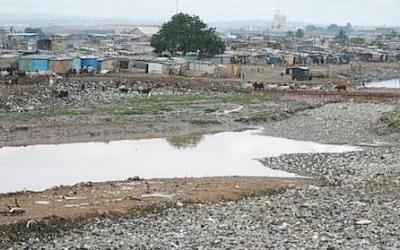
Audio By Carbonatix
Before 1961 when the government took over administration of the Korle lagoon, the leadership of Ga-Dangbe people manned the water body as it is within Ga-Dangbe territory.
The people maintained the lagoon with a taboo in Ga which translates directly to English as ‘you do not cross the Korle lagoon with a corpse.’
This was owed to the belief that a god, Korle, dwelled in the lagoon and he hated corpses. He also hated everything filthy and stinky. The people believed that persons who crossed the lagoon with a corpse or introduced dirt or stench into it, would introduce bad luck into their families. As a result, the lagoon was so clean that children went to play at its banks and the Ga-Dangbe community fed their homes with fish that came from it. The dominant fish caught here was tilapia in varied sizes.
When government took over the lagoon in 1961, it became a state property though the people continued to worship the Korle and perform traditional rituals in it. Right about this time, Accra was fast developing and modernization was fast creeping in with big roads, industries, immigration, Christianity and capitalism among others.
Several people who came to live in Accra, who had direct interaction with the lagoon did not know or understand the culture of the Ga-Dangbes and what the lagoon stood for. This meant that in the era of capitalism, the lagoon was exploited by smaller organisations and private individuals aside government activities.
By the early 90s, when Old Fadama popularly known as Sodom and Gomorrah was established, the toxin and stench in the Korle lagoon was becoming normal. Few years later, the lagoon would become unrecognizable.
By 2002, the Waste Management Department was able to manage only 60% of waste produced across the city. The remaining 40% ended up in the lagoon and some of it drained into the Gulf of Guinea. These included e-waste, industrial waste, plastic waste, human excrement, etc. (theguardian.com) Journalist Robert Bourgoin, after extensive research and consultancy with Theo Anderson, director of Friends of the Earth in Ghana, wrote that the Korle Lagoon is one of the most polluted places on earth.
The people of Ga-Dangbe reported that their god, Korle had left the lagoon. Revered for its ability to cleanse subjects of their sins and bad omen after washing with its water, the very essence of Korle was its cleanliness.
The introduction of stench and dirt into the Korle lagoon has not only deprived Accra of a potentially beautiful tourist site and economic income; it has also deprived a community of their god.
“Anderson thinks that the persistent strength of traditional beliefs in regions where Christian beliefs are weaker could be put to good use in enlisting people’s efforts for the protection and clean-up of the lagoons”. (Bourgoin, 2002).
Anderson is essentially saying that the authority of the Ga-Dangbe traditional leaders is key to solving the sanitation problem and achieving beautification of the Korle Lagoon¸ though he feared a dwindling sense of community could make this difficult. He also said that an environmental law accompanied by heavy penalties and effective enforcement would lead us in the right direction.
So when people felt obliged to obey the Korle as a god, the lagoon remained clean and served the community well. Unfortunately, modernization replaced obligation with freedom and the end result is evident in the lagoon today.
In light of the subject of taboos, I can gracefully conclude that this is proof that Ghanaian traditional culture is important for the progress of our nation and must not be left behind in an attempt to promote modernism and urbanization.
Latest Stories
-
Why the State must appeal Agradaa’s sentence reduction – Prof. Asare lists 5 reasons
1 hour -
Journalism must be a tool for development, not destruction — Sports Minister to AIPS
1 hour -
Interior Ministry urges honest self-assessment, strategic alignment at 2025 performance review workshop
2 hours -
InfoAnalytics predicts victory for Hajia Amina in Ayawaso East NDC Primary
3 hours -
Awakening road safety consciousness: Why passengers must be searched before boarding buses in Ghana
3 hours -
She Captures Humanity: A Humanitarian photography and social impact initiative
3 hours -
Ghanaian Swimming prodigy Yamin Amankwah Boamah sets 10 new PBs
3 hours -
Superstition Meets Real Harm: Witchcraft accusations, social injustice and weak protections in Northern Ghana
4 hours -
Nkrumahism, Mahama, and Africa’s unfinished cultural liberation
4 hours -
Group withdraws petition against unlicensed GoldBod actor, cites court proceedings
4 hours -
Threads of state: When cotton started a diplomatic incident
4 hours -
Dozens of MPs don smocks in cultural solidarity amid Ghana-Zambia ‘fugu’ controversy
5 hours -
AMA reclaims abandoned Alajo–Avenor open space in Accra; unveils green, beautification agenda
5 hours -
Trump removes video with racist clip depicting Obamas as apes
5 hours -
KCCR lecture presents new frontiers in snakebite treatment and care
5 hours

